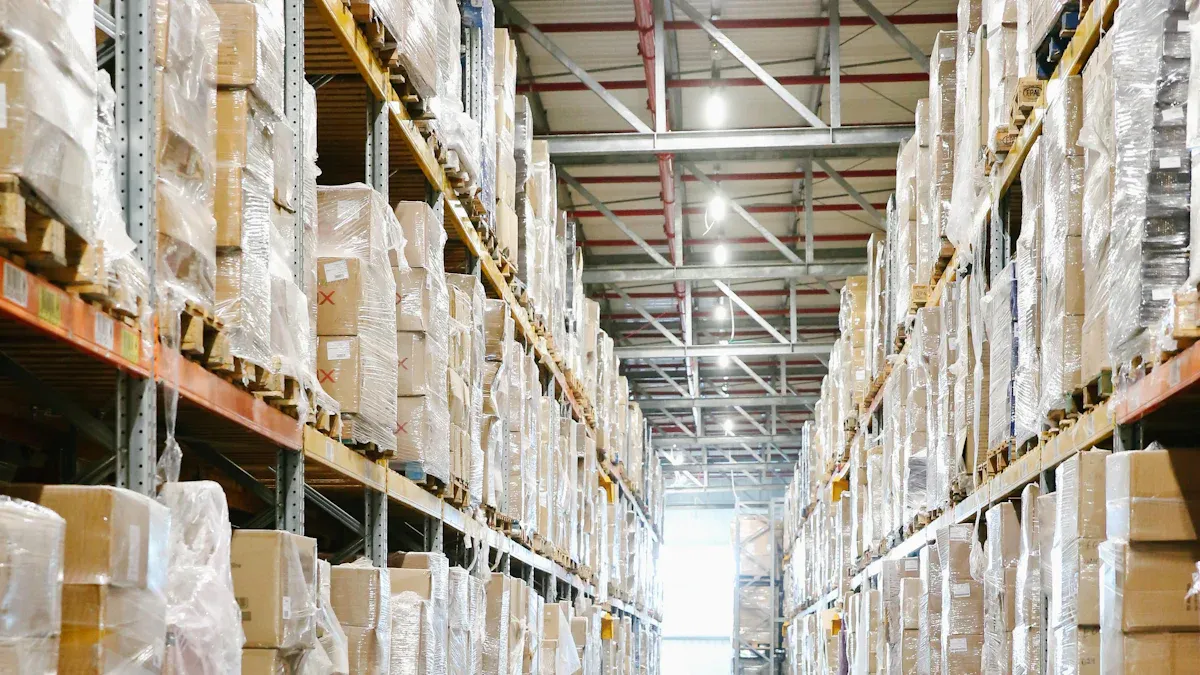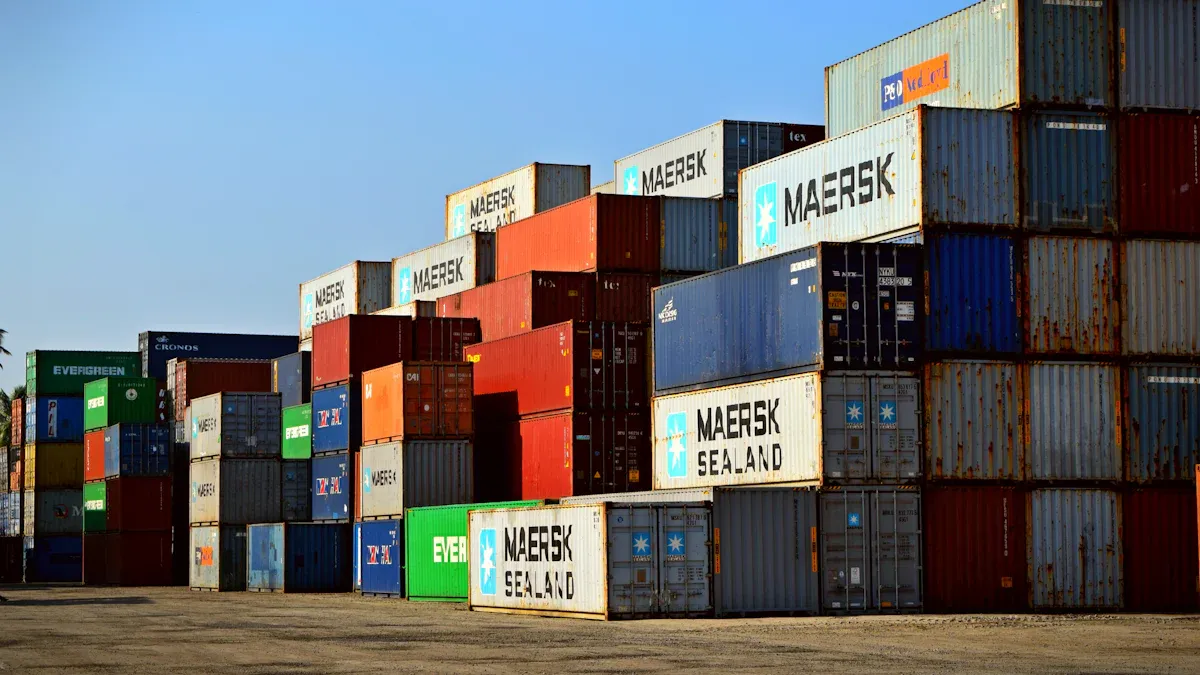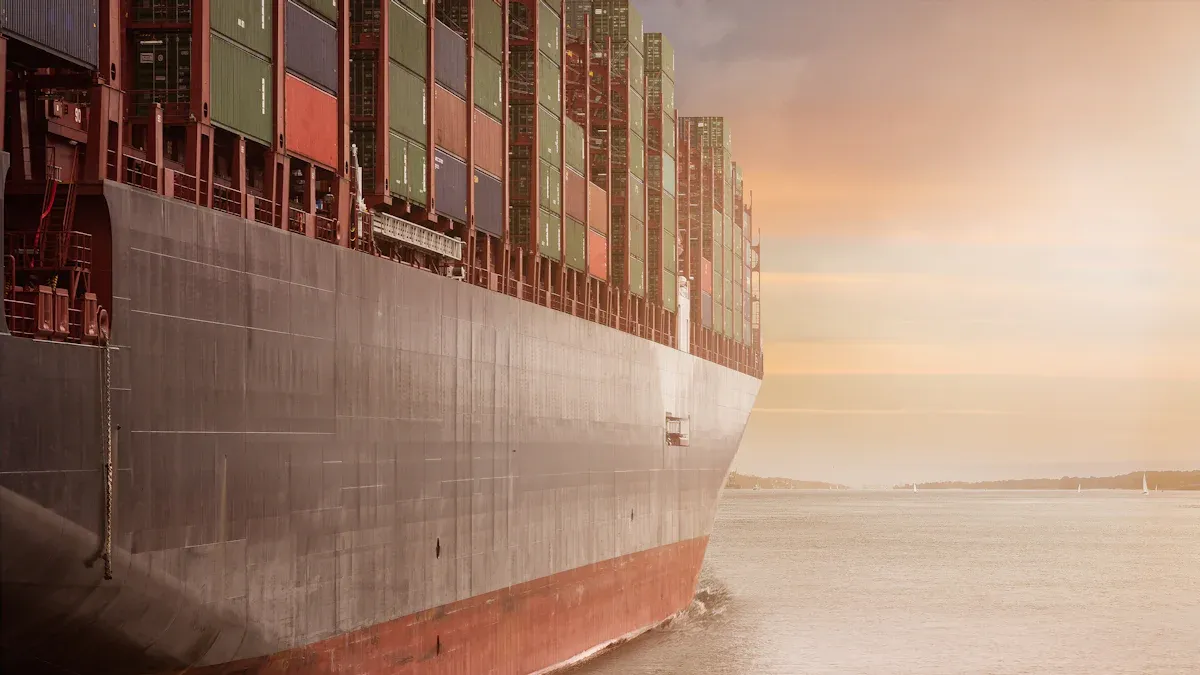Why Timeliness Is Key to Supply Chain Efficiency in 2025

Timeliness drives supply chain efficiency, shaping how you meet consumer demands. Rising expectations for faster delivery and real-time tracking push you to prioritize logistics timeliness. Consumers now expect transparency and personalized experiences. These shifts make timely logistics essential for staying competitive and ensuring customer satisfaction in today’s fast-paced global market.
Key Takeaways
Being on time in shipping is very important. It helps meet customer needs and keeps them happy. Delivering on time builds trust and loyalty.
Use live tracking and smart tools to make shipping better. These tools help you spot delays early and find faster routes.
Fix any communication problems in your supply chain. Clear talks and simple steps make shipping smoother and cut down delays.
The Role of Logistics Timeliness in Supply Chain Management

Defining Timeliness in Supply Chain Operations
Timeliness in supply chain operations ensures the smooth running supply chain by delivering goods and services at the right time. It involves more than just meeting deadlines. You need real-time tracking and access to accurate data to reduce operational risks. Delays in receiving critical information can lead to inefficiencies and costly decisions. Effective logistics management requires understanding when events occur and when they are reported. This dual focus on occurrence and submission times helps you assess data quality and reliability, ensuring your supply chain performs at its best.
How Timely Logistics Meets Customer Expectations
Timely logistics plays a vital role in enhancing the customer experience. Customers expect timely delivery, accurate order fulfillment, and seamless communication. Meeting these expectations builds trust and loyalty. Flexible delivery options cater to individual preferences, while hassle-free returns simplify the process for customers. Innovations like automation and last-mile delivery solutions, such as drones, further improve performance. Real-time tracking also provides transparency, allowing customers to monitor their orders. By prioritizing timely logistics, you not only meet but exceed customer expectations, creating a competitive advantage.
Aligning Timeliness with Supply Chain Goals and Competitiveness
Aligning logistics timeliness with your supply chain goals strengthens your competitiveness. This alignment optimizes internal processes, improves collaboration among stakeholders, and enhances resilience against market fluctuations. You can respond quickly to demand changes, manage inventory effectively, and maintain operational flexibility. These improvements reduce costs and boost customer satisfaction. A well-timed supply chain ensures you stay ahead in a dynamic market, delivering consistent value to your customers and stakeholders.
Benefits of Timely Logistics for Supply Chain Efficiency
Cost Optimization Through Timely Operations
Timely logistics reduces costs by improving operational efficiency. When you optimize deliveries, you minimize delays and avoid unnecessary expenses. For example, real-time tracking allows you to adjust delivery routes dynamically, saving fuel and reducing waste. This approach not only cuts costs but also enhances delivery performance.
Benefit | Explanation |
|---|---|
Optimizing logistics can lower fuel consumption and emissions, reducing the environmental footprint of operations. | |
Increase Competitiveness | Lower logistics costs enable businesses to offer lower prices or reinvest savings into other areas, enhancing their market position. |
Enhance Customer Satisfaction | Streamlined logistics lead to timely and reliable delivery, meeting customer expectations and fostering loyalty. |
By focusing on timely operations, you create a smooth running supply chain that balances cost savings with effective logistics management.
Enhancing Customer Satisfaction and Loyalty
Timely delivery directly impacts the customer experience. When you deliver orders on time, customers feel valued and trust your brand. Real-time tracking provides transparency, allowing customers to monitor their orders and feel in control. This builds loyalty and encourages repeat business.
Better logistics timeliness also improves order accuracy and reduces the chances of errors. Flexible delivery options and hassle-free returns further enhance satisfaction. By prioritizing timely logistics, you exceed expectations and strengthen customer relationships.
Risk Mitigation and Supply Chain Resilience
Timeliness plays a critical role in mitigating risks and building resilience in supply chain management. Economic risks like supplier bankruptcies or recessions can disrupt operations. Environmental risks, such as natural disasters, and political risks, including tariffs or export restrictions, also pose challenges.
Economic risks: supplier bankruptcies, recessions, work stoppages.
Environmental risks: natural disasters like floods and earthquakes.
Political risks: civil unrest, tariffs, export restrictions.
Ethical risks: child labor, forced labor, inadequate worker protections.
Timely logistics helps you recover quickly from disruptions. The "Time-to-Thrive" concept emphasizes the importance of adapting to changes swiftly. Shorter response times allow you to assess risks and implement preventive measures, ensuring a resilient supply chain.
Overcoming Challenges to Logistics Timeliness in 2025
Addressing Supply Chain Disruptions and Uncertainties
Disruptions in supply chain management can arise from various factors, including economic instability, geopolitical shifts, and regulatory changes. These uncertainties affect logistics timeliness and require proactive strategies to mitigate their impact.
Global Economic Uncertainty: Fluctuating oil prices and inflation disrupt cost structures.
Shifting Geopolitical Relations: Trade policy changes alter import/export activities.
Regulatory Compliance: New regulations demand operational adjustments.
Sustainability Urgency: Pressure to adopt eco-friendly practices impacts logistics operations.
Changing Consumer Demands: Political and economic shifts influence customer expectations.
To address these challenges, you need to adopt flexible logistics operations that can adapt to changing conditions. Real-time tracking systems provide visibility into disruptions, enabling you to adjust delivery and lead times effectively. By staying informed and agile, you can maintain performance and ensure timely logistics.
Tackling Inefficiencies in Communication and Processes
Poor communication and outdated processes hinder logistics timeliness. Misunderstandings among stakeholders delay decision-making, while lack of visibility complicates tracking shipments. Inadequate technology integration creates data silos, reducing the effectiveness of logistics management.
You can overcome these inefficiencies by:
Setting clear expectations for communication frequency and methods.
Leveraging supply chain management systems for real-time tracking and transparency.
Training teams on tools and soft skills to improve collaboration.
Regularly reviewing communication practices to identify areas for improvement.
Effective logistics relies on seamless communication and streamlined processes. By addressing these inefficiencies, you enhance delivery performance and ensure smooth logistics operations.
Balancing Speed with Sustainability in Supply Chain Management
Balancing speed and sustainability is critical for modern supply chains. Fast delivery often conflicts with eco-friendly practices, but innovative solutions can bridge this gap.
Use electric or hybrid vehicles to reduce emissions without compromising delivery times.
Employ AI for route optimization and efficient inventory management, minimizing waste and expediting processes.
Adopt sustainable packaging, such as biodegradable materials, to improve fuel efficiency and meet consumer demands.
Implement energy-efficient warehouses to lower carbon emissions and save costs.
Transparent communication with clients about sustainable timelines ensures you meet their urgency while maintaining eco-friendly practices. By integrating these strategies, you achieve effective logistics that align with both speed and sustainability goals.
Strategies and Technologies for Ensuring Timely Logistics in 2025

Leveraging Real-Time Tracking and Predictive Analytics
Real-time tracking has transformed logistics by providing granular visibility into transportation processes. Technologies like GPS, RFID tags, and IoT devices allow you to monitor shipments at every stage. These advancements reduce human error and improve productivity when integrated with automated warehousing systems. Emerging tools such as drones, 2D barcodes, and 5G connectivity further enhance tracking capabilities, ensuring you stay informed about your supply chain's status.
Predictive analytics complements real-time tracking by optimizing routes and forecasting potential delays. Using historical data and real-time insights, you can identify the best delivery routes, saving time and costs. Predictive tools also help you anticipate disruptions, enabling proactive adjustments to maintain logistics timeliness. By leveraging these technologies, you enhance logistics management and create a more responsive supply chain.
Automation and AI for Streamlined Supply Chain Operations
Automation and AI play a pivotal role in achieving timely logistics. Automated systems improve accuracy by reducing manual errors. For instance, barcode scanners and RFID technology capture product information seamlessly. AI enhances decision-making by analyzing real-time data, allowing you to respond quickly to demand spikes or disruptions.
Benefit | Description |
|---|---|
Increased accuracy and error reduction | Automation minimizes mistakes, ensuring smooth operations. |
Faster decision-making and responsiveness | AI-driven insights enable quick adjustments to meet changing demands. |
Improved customer satisfaction | Transparent processes and traceability foster trust and loyalty. |
AI also optimizes warehouse operations, from picking to packing, and determines efficient delivery routes by analyzing traffic and weather conditions. These innovations ensure your supply chain remains agile and efficient.
The Role of JUSDA’s China-Europe Express Rail in Timely Logistics
JUSDA’s China-Europe Express Rail offers a unique solution for businesses seeking timely and cost-effective logistics. This service bridges the gap between speed and affordability, delivering goods in 15-20 days—faster than sea freight and more economical than air freight. It supports a wide range of products, including electronics, clothing, and medical supplies, making it versatile for various industries.
The rail service integrates seamlessly with JUSDA’s extensive logistics network, ensuring smooth customs operations and reducing delays. Its ability to handle intermodal solutions, such as sea-rail connections, enhances connectivity for goods from regions like Southeast Asia. By leveraging this service, you can optimize your supply chain, reduce transit times, and improve delivery performance.

JUSDA Solutions
To provide you with professional solutions and quotations.
Timeliness remains the backbone of supply chain efficiency in 2025. By prioritizing logistics, you ensure the right product to the right place at the right time, meeting customer expectations and driving higher customer satisfaction. Leveraging technology and solutions like JUSDA’s services enhances reliable shipping, streamlines order fulfillment, and strengthens the logistics of the supply chain.
Timeliness builds trust, reputation, and operational efficiency, ensuring your business stays competitive in a fast-paced market.
See Also
Top Five Trends Shaping Future Supply Chain Efficiency
Get Prepared: Discovering New Transport Technologies for Supply Chains
Embracing Change: Adjusting to Technology-Enhanced Supply Chain Strategies
